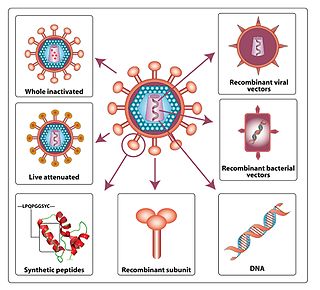
An HIV vaccine is a potential vaccine that could be either a preventive vaccine or a therapeutic vaccine, which means it would either protect individuals from being infected with HIV or treat HIV-infected individuals.

Elan Corporation plc was a major drugs firm based in Dublin, Ireland, which had major interests in the United States. It was listed on the New York Stock Exchange as ELN, the Irish Stock Exchange as ELN.I, and the London Stock Exchange as ELN.L. In 2013, the company merged with Perrigo to form Perrigo Company PLC.

Bruton's tyrosine kinase, also known as tyrosine-protein kinase BTK, is a tyrosine kinase that is encoded by the BTK gene in humans. BTK plays a crucial role in B cell development.

B-lymphocyte antigen CD20 or CD20 is expressed on the surface of all B-cells beginning at the pro-B phase and progressively increasing in concentration until maturity.

Belimumab, sold under the brand name Benlysta, is a human monoclonal antibody that inhibits B-cell activating factor (BAFF), also known as B-lymphocyte stimulator (BLyS). It is approved in the United States and Canada, and the European Union to treat systemic lupus erythematosus and lupus nephritis.
Ocrelizumab, sold under the brand name Ocrevus, is a medication used for the treatment of multiple sclerosis (MS). It is a humanized anti-CD20 monoclonal antibody. It targets CD20 marker on B lymphocytes and is an immunosuppressive drug. Ocrelizumab binds to an epitope that overlaps with the epitope to which rituximab binds.
Toralizumab was a humanized monoclonal antibody and an immunosuppressive drug. Possible indications included treatment of antibody-mediated disorders, T-cell-mediated diseases, and B-cell malignancies such as CLL/small lymphocytic lymphoma, follicular cell lymphoma grade I or II, marginal zone lymphoma, mantle cell lymphoma, MALT lymphoma, Waldenström's macroglobulinemia, monocytoid B-cell lymphoma; relapsed/refractory Hodgkin's disease).
Epratuzumab is a humanized monoclonal antibody. Potential uses may be found in oncology and in treatment of inflammatory autoimmune disorders, such as systemic lupus erythematosus (SLE).

B-cell activating factor (BAFF) also known as tumor necrosis factor ligand superfamily member 13B and CD257 among other names, is a protein that in humans is encoded by the TNFSF13B gene. BAFF is also known as B Lymphocyte Stimulator (BLyS) and TNF- and APOL-related leukocyte expressed ligand (TALL-1) and the Dendritic cell-derived TNF-like molecule.

BAFF receptor, also known as tumor necrosis factor receptor superfamily member 13C (TNFRSF13C) and BLyS receptor 3 (BR3), is a membrane protein of the TNF receptor superfamily which recognizes BAFF, an essential factor for B cell maturation and survival. In humans it is encoded by the TNFRSF13C gene.

B-cell maturation antigen, also known as tumor necrosis factor receptor superfamily member 17 (TNFRSF17), is a protein that in humans is encoded by the TNFRSF17 gene.
Cixutumumab (IMC-A12) is a human monoclonal antibody for the treatment of solid tumors.
Ramucirumab is a fully human monoclonal antibody (IgG1) developed for the treatment of solid tumors. This drug was developed by ImClone Systems Inc. It was isolated from a native phage display library from Dyax.
Tanezumab is a monoclonal antibody against nerve growth factor as a treatment for pain via a novel mechanisms different from conventional pain-killer drugs. Tanezumab was discovered and developed by Rinat Neuroscience and was acquired by Pfizer in 2006.

Lupus, technically known as systemic lupus erythematosus (SLE), is an autoimmune disease in which the body's immune system mistakenly attacks healthy tissue in many parts of the body. Symptoms vary among people and may be mild to severe. Common symptoms include painful and swollen joints, fever, chest pain, hair loss, mouth ulcers, swollen lymph nodes, feeling tired, and a red rash which is most commonly on the face. Often there are periods of illness, called flares, and periods of remission during which there are few symptoms.
Brentuximab vedotin, sold under the brand name Adcetris, is an antibody-drug conjugate medication used to treat relapsed or refractory Hodgkin lymphoma (HL) and systemic anaplastic large cell lymphoma (ALCL), a type of T cell non-Hodgkin lymphoma. It selectively targets tumor cells expressing the CD30 antigen, a defining marker of Hodgkin lymphoma and ALCL. The drug is being jointly marketed by Millennium Pharmaceuticals outside the US and by Seagen in the US.
Blisibimod is a selective antagonist of B-cell activating factor, being developed by Anthera Pharmaceuticals as a treatment for systemic lupus erythematosus. It is currently under active investigation in clinical trials.

Anthera Pharmaceuticals, Inc. is an American biopharmaceutical company focused on developing and commercializing products to treat serious conditions associated with cystic fibrosis, inflammation and autoimmune diseases. Liprotamase (Sollpura), Anthera's leading drug candidate which is being developed for exocrine pancreatic insufficiency (EPI) is currently in Phase 3 clinical trials, and A-623 (Blisibimod) for the treatment of IgA nephropathy is currently in Phase 2 clinical trial.

Sifalimumab is a human monoclonal antibody designed for the treatment of SLE, dermatomyositis, and polymyositis. It targets interferon a.
Seagen Inc. is an American biotechnology company focused on developing and commercializing innovative, empowered monoclonal antibody-based therapies for the treatment of cancer. The company, headquartered in Bothell, Washington, is the industry leader in antibody-drug conjugates or ADCs, a technology designed to harness the targeting ability of monoclonal antibodies to deliver cell-killing agents directly to cancer cells. Antibody-drug conjugates are intended to spare non-targeted cells and thus reduce many of the toxic effects of traditional chemotherapy, while potentially enhancing antitumor activity.
Now dropped by Lilly due to lack of efficacy.










